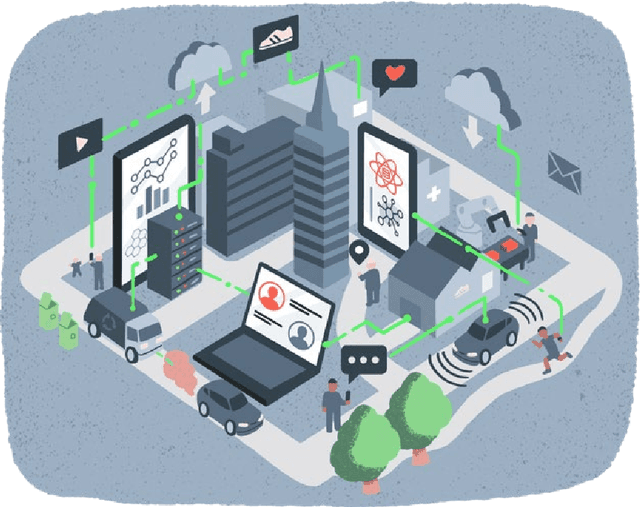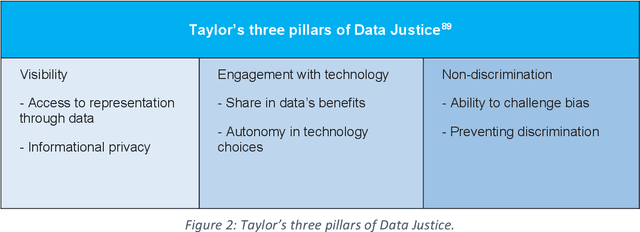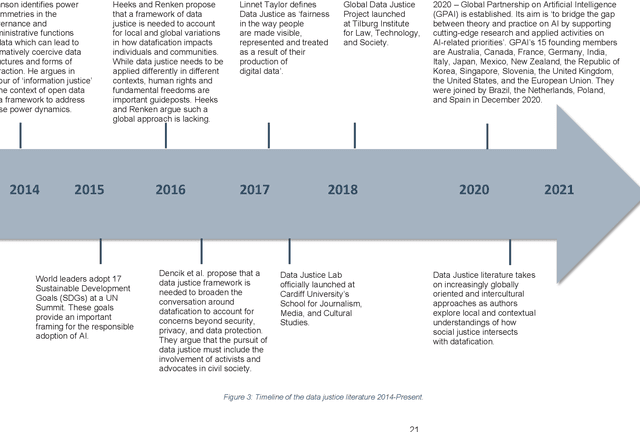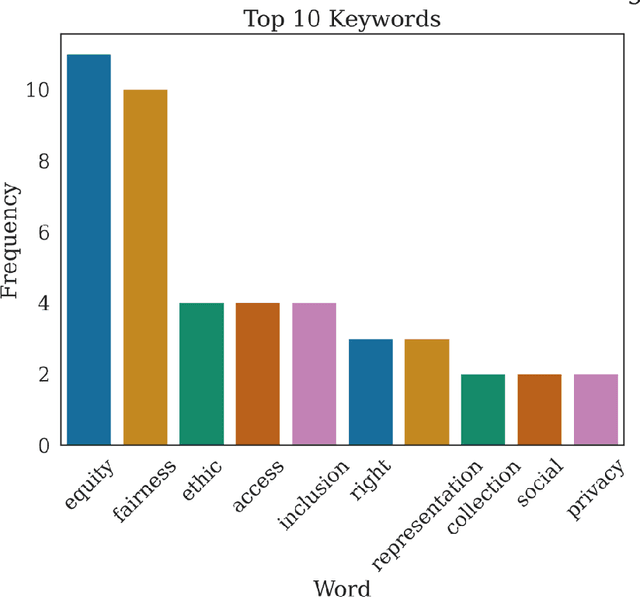Jatinder Singh
Accountability Capture: How Record-Keeping to Support AI Transparency and Accountability (Re)shapes Algorithmic Oversight
Oct 06, 2025Abstract:Accountability regimes typically encourage record-keeping to enable the transparency that supports oversight, investigation, contestation, and redress. However, implementing such record-keeping can introduce considerations, risks, and consequences, which so far remain under-explored. This paper examines how record-keeping practices bring algorithmic systems within accountability regimes, providing a basis to observe and understand their effects. For this, we introduce, describe, and elaborate 'accountability capture' -- the re-configuration of socio-technical processes and the associated downstream effects relating to record-keeping for algorithmic accountability. Surveying 100 practitioners, we evidence and characterise record-keeping issues in practice, identifying their alignment with accountability capture. We further document widespread record-keeping practices, tensions between internal and external accountability requirements, and evidence of employee resistance to practices imposed through accountability capture. We discuss these and other effects for surveillance, privacy, and data protection, highlighting considerations for algorithmic accountability communities. In all, we show that implementing record-keeping to support transparency in algorithmic accountability regimes can itself bring wider implications -- an issue requiring greater attention from practitioners, researchers, and policymakers alike.
Position is Power: System Prompts as a Mechanism of Bias in Large Language Models (LLMs)
May 27, 2025Abstract:System prompts in Large Language Models (LLMs) are predefined directives that guide model behaviour, taking precedence over user inputs in text processing and generation. LLM deployers increasingly use them to ensure consistent responses across contexts. While model providers set a foundation of system prompts, deployers and third-party developers can append additional prompts without visibility into others' additions, while this layered implementation remains entirely hidden from end-users. As system prompts become more complex, they can directly or indirectly introduce unaccounted for side effects. This lack of transparency raises fundamental questions about how the position of information in different directives shapes model outputs. As such, this work examines how the placement of information affects model behaviour. To this end, we compare how models process demographic information in system versus user prompts across six commercially available LLMs and 50 demographic groups. Our analysis reveals significant biases, manifesting in differences in user representation and decision-making scenarios. Since these variations stem from inaccessible and opaque system-level configurations, they risk representational, allocative and potential other biases and downstream harms beyond the user's ability to detect or correct. Our findings draw attention to these critical issues, which have the potential to perpetuate harms if left unexamined. Further, we argue that system prompt analysis must be incorporated into AI auditing processes, particularly as customisable system prompts become increasingly prevalent in commercial AI deployments.
Trustworthy, responsible, ethical AI in manufacturing and supply chains: synthesis and emerging research questions
May 19, 2023Abstract:While the increased use of AI in the manufacturing sector has been widely noted, there is little understanding on the risks that it may raise in a manufacturing organisation. Although various high level frameworks and definitions have been proposed to consolidate potential risks, practitioners struggle with understanding and implementing them. This lack of understanding exposes manufacturing to a multitude of risks, including the organisation, its workers, as well as suppliers and clients. In this paper, we explore and interpret the applicability of responsible, ethical, and trustworthy AI within the context of manufacturing. We then use a broadened adaptation of a machine learning lifecycle to discuss, through the use of illustrative examples, how each step may result in a given AI trustworthiness concern. We additionally propose a number of research questions to the manufacturing research community, in order to help guide future research so that the economic and societal benefits envisaged by AI in manufacturing are delivered safely and responsibly.
Understanding accountability in algorithmic supply chains
Apr 28, 2023

Abstract:Academic and policy proposals on algorithmic accountability often seek to understand algorithmic systems in their socio-technical context, recognising that they are produced by 'many hands'. Increasingly, however, algorithmic systems are also produced, deployed, and used within a supply chain comprising multiple actors tied together by flows of data between them. In such cases, it is the working together of an algorithmic supply chain of different actors who contribute to the production, deployment, use, and functionality that drives systems and produces particular outcomes. We argue that algorithmic accountability discussions must consider supply chains and the difficult implications they raise for the governance and accountability of algorithmic systems. In doing so, we explore algorithmic supply chains, locating them in their broader technical and political economic context and identifying some key features that should be understood in future work on algorithmic governance and accountability (particularly regarding general purpose AI services). To highlight ways forward and areas warranting attention, we further discuss some implications raised by supply chains: challenges for allocating accountability stemming from distributed responsibility for systems between actors, limited visibility due to the accountability horizon, service models of use and liability, and cross-border supply chains and regulatory arbitrage
Out of Context: Investigating the Bias and Fairness Concerns of "Artificial Intelligence as a Service"
Feb 02, 2023Abstract:"AI as a Service" (AIaaS) is a rapidly growing market, offering various plug-and-play AI services and tools. AIaaS enables its customers (users) - who may lack the expertise, data, and/or resources to develop their own systems - to easily build and integrate AI capabilities into their applications. Yet, it is known that AI systems can encapsulate biases and inequalities that can have societal impact. This paper argues that the context-sensitive nature of fairness is often incompatible with AIaaS' 'one-size-fits-all' approach, leading to issues and tensions. Specifically, we review and systematise the AIaaS space by proposing a taxonomy of AI services based on the levels of autonomy afforded to the user. We then critically examine the different categories of AIaaS, outlining how these services can lead to biases or be otherwise harmful in the context of end-user applications. In doing so, we seek to draw research attention to the challenges of this emerging area.
Exploring How Machine Learning Practitioners (Try To) Use Fairness Toolkits
May 13, 2022
Abstract:Recent years have seen the development of many open-source ML fairness toolkits aimed at helping ML practitioners assess and address unfairness in their systems. However, there has been little research investigating how ML practitioners actually use these toolkits in practice. In this paper, we conducted the first in-depth empirical exploration of how industry practitioners (try to) work with existing fairness toolkits. In particular, we conducted think-aloud interviews to understand how participants learn about and use fairness toolkits, and explored the generality of our findings through an anonymous online survey. We identified several opportunities for fairness toolkits to better address practitioner needs and scaffold them in using toolkits effectively and responsibly. Based on these findings, we highlight implications for the design of future open-source fairness toolkits that can support practitioners in better contextualizing, communicating, and collaborating around ML fairness efforts.
Advancing Data Justice Research and Practice: An Integrated Literature Review
Apr 06, 2022



Abstract:The Advancing Data Justice Research and Practice (ADJRP) project aims to widen the lens of current thinking around data justice and to provide actionable resources that will help policymakers, practitioners, and impacted communities gain a broader understanding of what equitable, freedom-promoting, and rights-sustaining data collection, governance, and use should look like in increasingly dynamic and global data innovation ecosystems. In this integrated literature review we hope to lay the conceptual groundwork needed to support this aspiration. The introduction motivates the broadening of data justice that is undertaken by the literature review which follows. First, we address how certain limitations of the current study of data justice drive the need for a re-location of data justice research and practice. We map out the strengths and shortcomings of the contemporary state of the art and then elaborate on the challenges faced by our own effort to broaden the data justice perspective in the decolonial context. The body of the literature review covers seven thematic areas. For each theme, the ADJRP team has systematically collected and analysed key texts in order to tell the critical empirical story of how existing social structures and power dynamics present challenges to data justice and related justice fields. In each case, this critical empirical story is also supplemented by the transformational story of how activists, policymakers, and academics are challenging longstanding structures of inequity to advance social justice in data innovation ecosystems and adjacent areas of technological practice.
Reviewable Automated Decision-Making: A Framework for Accountable Algorithmic Systems
Feb 10, 2021


Abstract:This paper introduces reviewability as a framework for improving the accountability of automated and algorithmic decision-making (ADM) involving machine learning. We draw on an understanding of ADM as a socio-technical process involving both human and technical elements, beginning before a decision is made and extending beyond the decision itself. While explanations and other model-centric mechanisms may assist some accountability concerns, they often provide insufficient information of these broader ADM processes for regulatory oversight and assessments of legal compliance. Reviewability involves breaking down the ADM process into technical and organisational elements to provide a systematic framework for determining the contextually appropriate record-keeping mechanisms to facilitate meaningful review - both of individual decisions and of the process as a whole. We argue that a reviewability framework, drawing on administrative law's approach to reviewing human decision-making, offers a practical way forward towards more a more holistic and legally-relevant form of accountability for ADM.
Decision Provenance: Capturing data flow for accountable systems
Apr 16, 2018


Abstract:Demand is growing for more accountability in the technological systems that increasingly occupy our world. However, the complexity of many of these systems - often systems of systems - poses accountability challenges. This is because the details and nature of the data flows that interconnect and drive systems, which often occur across technical and organisational boundaries, tend to be opaque. This paper argues that data provenance methods show much promise as a technical means for increasing the transparency of these interconnected systems. Given concerns with the ever-increasing levels of automated and algorithmic decision-making, we make the case for decision provenance. This involves exposing the 'decision pipeline' by tracking the chain of inputs to, and flow-on effects from, the decisions and actions taken within these systems. This paper proposes decision provenance as a means to assist in raising levels of accountability, discusses relevant legal conceptions, and indicates some practical considerations for moving forward.
 Add to Chrome
Add to Chrome Add to Firefox
Add to Firefox Add to Edge
Add to Edge